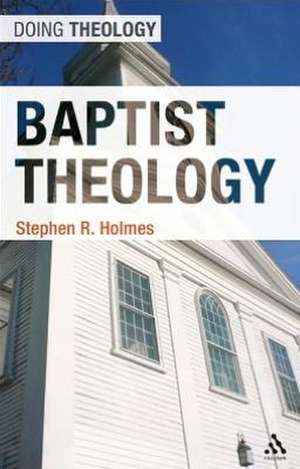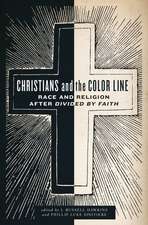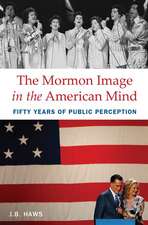Baptist Theology: Doing Theology
Autor Stephen R. Holmesen Limba Engleză Hardback – 25 apr 2012
This book considers the distinctive ideas and expressions of Christian faith to be found in the historic Baptist churches. An outline of the history of the Baptist movement will be offered, from its British beginnings in Amsterdam in 1609, through its varied developments in Britain, Europe and North America, to its worldwide presence and diversity today, and its relationship to many other churches with apparently-similar practices (Pentecostal and 'new' churches, e.g.).
Holmes draws the various threads together, noting the real diversities in the history of Baptist theology, but suggesting that in a vision of the present and urgent Lordship of Christ experienced in the local congregation, there is a thread that links most of these distinctives.
| Toate formatele și edițiile | Preț | Express |
|---|---|---|
| Paperback (1) | 165.48 lei 6-8 săpt. | |
| Bloomsbury Publishing – 25 apr 2012 | 165.48 lei 6-8 săpt. | |
| Hardback (1) | 564.30 lei 3-5 săpt. | |
| Bloomsbury Publishing – 25 apr 2012 | 564.30 lei 3-5 săpt. |
Preț: 564.30 lei
Preț vechi: 724.20 lei
-22% Nou
107.97€ • 113.34$ • 89.62£
Carte disponibilă
Livrare economică 20 martie-03 aprilie
Specificații
ISBN-10: 0567650979
Pagini: 192
Dimensiuni: 145 x 224 x 15 mm
Greutate: 0.25 kg
Ediția:New.
Editura: Bloomsbury Publishing
Colecția T&T Clark
Seria Doing Theology
Locul publicării:London, United Kingdom
Descriere
Caracteristici
Notă biografică
Cuprins
Recenzii
Do Baptists have a theology? The answer, as this book clearly shows, is 'Yes'. But what sort of theology is it? Is it a version of Protestant evangelicalism, democratic individualism, or radical sectarianism? Holmes offers an account of Baptist theology as an activity that attends closely to the convictions and practices of congregations. This explains why expressions of Baptist theology often vary significantly. Yet in the particular attention to local gatherings, Holmes displays that Baptists still share the theological consensus of the wider church on such basic doctrines as the Trinity, the person and work of Christ, and creation. But as Holmes also makes plain, this emphasis on the gathered community finds distinctive manifestation in congregational church government, respect for the liberty of conscience, and participation in God's mission to the world. It is a clear and concise summary of Baptist theology that deserves to be widely used.
This volume focuses on the origins and establishment of baptism and proposes a key concept of the Church as a local community . . . A book which should be of interest to more than just evangelical Protestants.



















